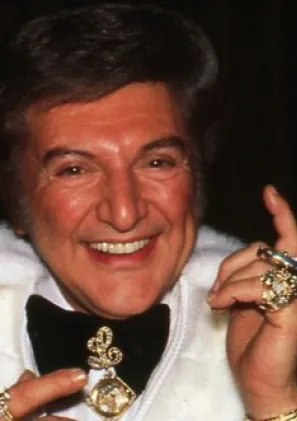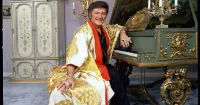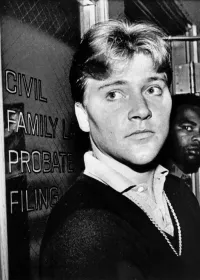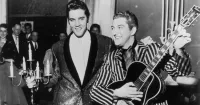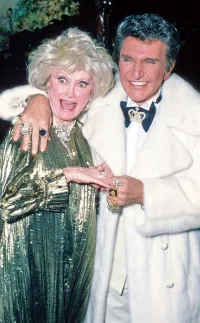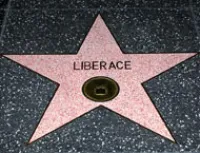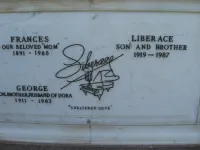Biography
1919 - 1987
"Nobody will believe in you unless you believe in yourself"
- Liberace
Wladziu Valentino Liberace was born in West Allis, Wisconsin. On May 16, 1919. At age 4 he learned to play the piano by ear. As a teen, he earned money playing the piano in assorted venues and eventually attended the Wisconsin College of Music. In 1939, following a classical recital, Liberace played the popular tune, “Three Little Fishes”, in a semi-classical style. The audience’s enthusiastic response convinced him he was onto something. After reinventing his act throughout the 1940s, the Liberace Show debuted in 1952 and soon became one of the most popular shows on television. In 1955 he took a break to star in the film “Sincerely Yours.” Over the next two decades Liberace continued to dazzle his intensely loyal fans by adding more rhinestones, sequins, and fur capes to the flamboyant costumes that turned his recitals into extravaganzas. Declaring himself “Mr. Showmanship,” he found immense success in Las Vegas, where the $300,000 he earned each week at the height of his fame made him the highest-paid entertainer in the world. Liberace received many honors and awards during his lifetime including two Emmys, six gold albums, two stars on the Hollywood Walk of Fame, and the title “Entertainer of the Year”. A closeted homosexual his entire life, he was hounded by rumors that often threatened the carefully crafted fantasy his fans shared. When the Daily Mirror newspaper and Confidential magazine attempted to out him he sued both publications and won damages and legal fees. Liberace's best known relationship was with his "on-stage chauffeur", performer Scott Thorson, who moved into the entertainer's mansion in 1977 and remained there until he was kicked out five years later. Thorson unsuccessfully sued for palimony in a case that was splashed across the tabloids. Despite suffering from heart disease and emphysema, Liberace continued performing until his final concert at Radio City Music Hall on November 2, 1986. Fearing rejection from his adoring public, he kept the AIDS diagnosis he had received earlier in the year a secret until his death in his Palm Springs home at age 67 on February 4, 1987. On the heels of Rock Hudson’s death from AIDS two years earlier, Liberace’s passing was another wake-up call for middle-America which had been deluding itself about the gay people in its midst for two centuries.
1919 - 1987
"Nobody will believe in you unless you believe in yourself"
- Liberace
Wladziu Valentino Liberace was born in West Allis, Wisconsin. On May 16, 1919. At age 4 he learned to play the piano by ear. As a teen, he earned money playing the piano in assorted venues and eventually attended the Wisconsin College of Music. In 1939, following a classical recital, Liberace played the popular tune, “Three Little Fishes”, in a semi-classical style. The audience’s enthusiastic response convinced him he was onto something. After reinventing his act throughout the 1940s, the Liberace Show debuted in 1952 and soon became one of the most popular shows on television. In 1955 he took a break to star in the film “Sincerely Yours.” Over the next two decades Liberace continued to dazzle his intensely loyal fans by adding more rhinestones, sequins, and fur capes to the flamboyant costumes that turned his recitals into extravaganzas. Declaring himself “Mr. Showmanship,” he found immense success in Las Vegas, where the $300,000 he earned each week at the height of his fame made him the highest-paid entertainer in the world. Liberace received many honors and awards during his lifetime including two Emmys, six gold albums, two stars on the Hollywood Walk of Fame, and the title “Entertainer of the Year”. A closeted homosexual his entire life, he was hounded by rumors that often threatened the carefully crafted fantasy his fans shared. When the Daily Mirror newspaper and Confidential magazine attempted to out him he sued both publications and won damages and legal fees. Liberace's best known relationship was with his "on-stage chauffeur", performer Scott Thorson, who moved into the entertainer's mansion in 1977 and remained there until he was kicked out five years later. Thorson unsuccessfully sued for palimony in a case that was splashed across the tabloids. Despite suffering from heart disease and emphysema, Liberace continued performing until his final concert at Radio City Music Hall on November 2, 1986. Fearing rejection from his adoring public, he kept the AIDS diagnosis he had received earlier in the year a secret until his death in his Palm Springs home at age 67 on February 4, 1987. On the heels of Rock Hudson’s death from AIDS two years earlier, Liberace’s passing was another wake-up call for middle-America which had been deluding itself about the gay people in its midst for two centuries.
Demography
Demography
Gender Male
Sexual Orientation Gay
Gender Identity Cisgender
Ethnicity Caucasian/White
Faith Construct Catholic
Nations Affiliated United States
Era/Epoch AIDS Era (1980-present)
Field(s) of Contribution
Film
Music
Television
Commemorations & Honors
Two Emmy Awards
Six Gold Albums
Hollywood Walk of Fame Star For Recording and Television (1960)
Demography
Gender Male
Sexual Orientation Gay
Gender Identity Cisgender
Ethnicity Caucasian/White
Faith Construct Catholic
Nations Affiliated United States
Era/Epoch AIDS Era (1980-present)
Field(s) of Contribution
Film
Music
Television
Commemorations & Honors
Two Emmy Awards
Six Gold Albums
Hollywood Walk of Fame Star For Recording and Television (1960)
Resources
Resources
Faris, Jocelyn. Liberace: A Bio-Bibiliography. Westport, Conn.: Greenwood Publishing Group, 1995.
Hadleigh, Boze. Hollywood Gays. Barricade Books, 1996.
Liberace. An Autobiography. New York: G.P. Putnam's Sons, 1973.
Liberace. The Wonderful Private World of Liberace. Tony Palmer, ed. New York: Harper & Row, 1986.
Miller, Harriet H. I'll Be Seeing You : The Young Liberace. Las Vegas: Leesson Publisher, 1992.
Mungo, Ray. Liberace. Lives of Notable Gay Men and Lesbians. New York: Chelsea House Publishing, 1995.
Pyron, Darden Asbury. Liberace: An American Boy. Chicago: University of Chicago Press, 2000.
Thomas, Bob. Liberace: The True Story. New York: St. Martins Press, 1988.
Thorson, Scott, with Alex Thorleifson. Behind the Candelabra : My Life With Liberace. New York: Dutton, 1988.
https://en.wikipedia.org/wiki/Liberace
http://www.nytimes.com/1987/02/05/obituaries/liberace-flamboyant-pianist-is-dead.html
https://en.wikipedia.org/wiki/Behind_the_Candelabra
https://www.jacksonville.com/article/20130523/entertainment/801252478
https://www.mentalfloss.com/article/79531/13-fabulous-facts-about-liber…
Resources
Faris, Jocelyn. Liberace: A Bio-Bibiliography. Westport, Conn.: Greenwood Publishing Group, 1995.
Hadleigh, Boze. Hollywood Gays. Barricade Books, 1996.
Liberace. An Autobiography. New York: G.P. Putnam's Sons, 1973.
Liberace. The Wonderful Private World of Liberace. Tony Palmer, ed. New York: Harper & Row, 1986.
Miller, Harriet H. I'll Be Seeing You : The Young Liberace. Las Vegas: Leesson Publisher, 1992.
Mungo, Ray. Liberace. Lives of Notable Gay Men and Lesbians. New York: Chelsea House Publishing, 1995.
Pyron, Darden Asbury. Liberace: An American Boy. Chicago: University of Chicago Press, 2000.
Thomas, Bob. Liberace: The True Story. New York: St. Martins Press, 1988.
Thorson, Scott, with Alex Thorleifson. Behind the Candelabra : My Life With Liberace. New York: Dutton, 1988.
https://en.wikipedia.org/wiki/Liberace
http://www.nytimes.com/1987/02/05/obituaries/liberace-flamboyant-pianist-is-dead.html
https://en.wikipedia.org/wiki/Behind_the_Candelabra
https://www.jacksonville.com/article/20130523/entertainment/801252478
https://www.mentalfloss.com/article/79531/13-fabulous-facts-about-liber…
